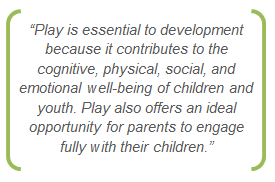The importance of play over the summer
If you’re like most parents, you’re probably scrambling to fill up the summer break with activities to keep your children busy while they are out of school. Some new research says you can put down your daily planner and leave some space on your calendar for unstructured free play. There is no need for you to arrange to have every waking moment filled with planned activities like swimming and tennis lessons, day camp, dance classes, sports activities and even summer school. The value of unstructured play is often overlooked. It results in increased executive functions (EFs), which control and manage cognitive processes. This helps children to develop skills like working memory, impulse control, decision-making, troubleshooting, and organizational skills they need for a successful future.
planner and leave some space on your calendar for unstructured free play. There is no need for you to arrange to have every waking moment filled with planned activities like swimming and tennis lessons, day camp, dance classes, sports activities and even summer school. The value of unstructured play is often overlooked. It results in increased executive functions (EFs), which control and manage cognitive processes. This helps children to develop skills like working memory, impulse control, decision-making, troubleshooting, and organizational skills they need for a successful future.
The University of Colorado recently published a study confirming the value of just letting children play. The study found that unstructured play increases “executive function” skills. This means that children who engage in free play are more likely to work independently as students, establish their own goals and concentrate better in a crowded classroom where chaos sometimes reigns.
Even experts who recommend some structure during the summer break for those who need help keeping up with or improving their reading skills note that play is an important part of the improvement plan. So, just what is meant by unstructured play?
Unstructured play versus structured play
Remember when you were a child and pushed chairs together and arranged sheets or blankets across them to create a fort? That is only one example of free or unstructured play. When children let their imaginations run wild and pretend a living room chair is a car they are driving to another country, they are engaging in free play. Having a backyard camp out is another example when children can make their own plans and rules.
their imaginations run wild and pretend a living room chair is a car they are driving to another country, they are engaging in free play. Having a backyard camp out is another example when children can make their own plans and rules.
Examples of structured play are things like swimming classes, dance lessons and sports activities. The events happen at defined times and places and are generally led by an adult. Even board games fall into this category since the children follow the established rules. If, instead, children create their own board game and use the freedom to create their own rules, it would become unstructured play.
Sometimes, the activities may seem to overlap. Avid readers may consider it play when they read their favorite book. That would be structured play. Writing their own story and turning it into a book they make and illustrate themselves is unstructured or free play.
Tangible benefits of free play
The American Academy of Pediatrics (AAP) has long been advocating for children to spend more time in free play. Specifically, the Academy states: “Play is essential to development because it contributes to the cognitive, physical, social, and emotional well-being of children and youth. Play also offers an ideal opportunity for parents to engage fully with their children.” Some of the benefits of free play discussed by the AAP include:
- Opportunities to practice decision making skills.
- Discovering their interests and passions.
- Assuming adult roles where they can control outcomes and overcome fears.
- Working with other children in groups.
- Negotiating, decision-making and creating rules for games with their peers.
- Promoting health through physical activity.
- Reducing stress.
- Learning the value of social bonds through interacting with other children.
- Building self-confidence since they are in charge.
- Learning self-direction (this may be the most valuable lesson children learn from free play).
Join in at playtime!
Parents should also spend time playing with their children. If your child wants to play “restaurant” and tells you to be the diner, comply with the request and enjoy watching him or her create a menu, take your order, and bring you pretend food. If your children invite you in to their blanket fort, go in and enjoy eating s’mores by the pretend campfire.
Have fun with your children as you encourage and participate in their unstructured play, knowing that they are developing valuable skills that will help them in the classroom and throughout their lives.
Key Takeaways:
- Don’t overbook children with structured activities over the summer.
- Free play helps children develop valuable skills, such as decision-making.
- Get involved! Let your children lead the activities during unstructured playtime.
Related Reading:
Building Unstructured Play Into the Structure of Each Day
Building a Fit Brain: The Serious Work of Play


Comments
I completely agree with this